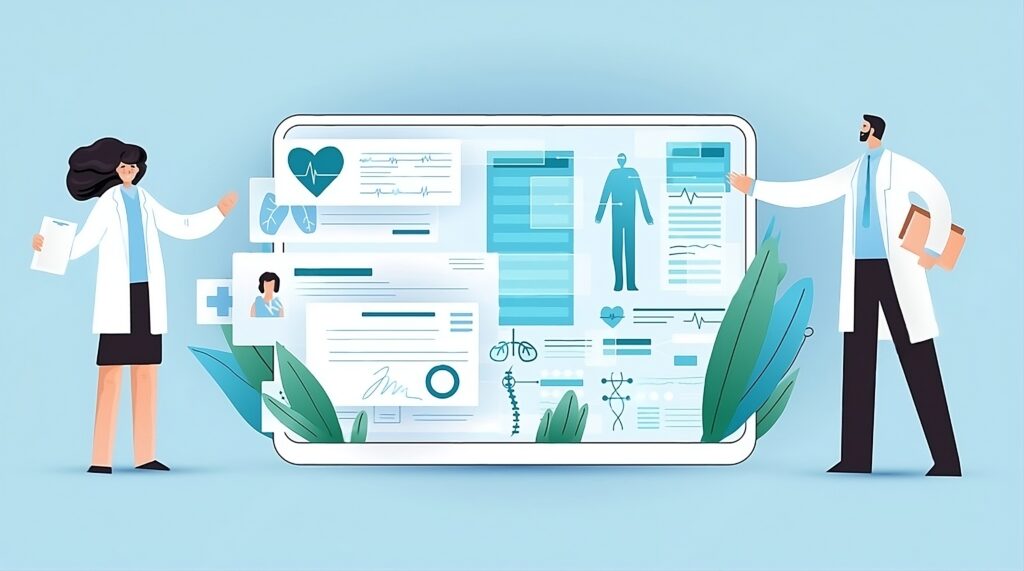
It is very important to keep track of patient information, appointments and medical records in a hospital or clinic. That’s where healthcare softwares come in.
There are so many choices, though, how do you know which one is best for your facility?
This article will talk about what healthcare softwares are, the different types that are out there and how to pick the best one for your clinic or hospital.
We’ll also talk about the pros and cons of medical software systems and what to look for in them.
Table of Contents
ToggleWhat are healthcare software programs?
Healthcare softwares are a type of digital tool that helps healthcare professionals keep track of medical records, appointments, billing and more.
These medical software programs are very important for making daily tasks easier, providing better care for patients and making sure that a medical facility runs smoothly.
These tools are meant to make healthcare more organized and efficient.
For Example: Medical software systems that keep track of patient data and healthcare management software that keeps track of appointments and billing.
Different kinds of healthcare software that hospitals and clinics can use
Hospitals and clinics use a lot of different kinds of healthcare softwares to meet their needs.
Here are some of the most common ones:
1. Software for Electronic Health Records (EHR)
Hospitals and clinics can store and manage patient medical records digitally with EHR software. It takes the place of paper records, which makes it easier for doctors and nurses to keep track of patients’ medical histories, test results, medications and more. EHR systems also make diagnoses and treatments faster and more accurate.
2. Software for Managing Healthcare
This healthcare software is used to manage and keep track of the administrative tasks of a medical facility. It has tools for keeping track of patients’ appointments, billing and inventory. This kind of healthcare software is meant to make things easier for healthcare workers so they can spend more time caring for patients.
3. Software for telemedicine
Telemedicine software is becoming more important as remote healthcare becomes more common. This software lets doctors and other healthcare professionals talk to patients over the phone, video or chat. It’s especially helpful for getting in touch with patients who live far away or who don’t want to go to the office.
4. Practice Management Software (PMS)
Practice management software, helps a clinic run more smoothly by making it easier to schedule appointments, check in patients, handle billing and file insurance claims. It works with electronic health record (EHR) systems to give a full picture of patient care and clinic operations.
What is Healthcare Management Software?
Healthcare management software is a general term for tools that help run healthcare facility. This can mean keeping track of staff schedules and medical supplies, as well as managing patient appointments and billing.
Most healthcare software works with other medical software systems, such as EHRs, to give you a full set of tools for handling both clinical and administrative tasks. This integration is important for making things run more smoothly, cutting down on mistakes and ultimately giving better care to patients.
TIP: You might not think scalability is important in healthcare softwares, but it is.
As your clinic or hospital gets bigger, your software needs to do more. You can be sure that your healthcare software will grow with your business if you choose one that is scalable.
This could mean adding new departments, seeing more patients or adding new services.
Scaling healthcare softwares saves you money on migrations and downtime, which will improve your ROI over time.
How to Choose the Right Healthcare Software for Your Facility
Choosing the right healthcare software is a big choice that will affect how well your hospital or clinic runs and how well you care for patients. When choosing your system, think about these things:
1. Know what you need
Find the problems you want to fix. Do you need to do a better job of keeping track of patient records? Or better scheduling of appointments and billing? Knowing what hurts you limits your choices.
2. Ability to grow
Your healthcare software should grow with your facility, as was said. Look for solutions that can handle more patients and more complicated operations.
3. Working with current systems
Make sure that the software works well with your current systems, such as EHR, billing and pharmacy management, to cut down on mistakes and avoid having to do things twice.
A study from 2023 found that 78% of healthcare providers said their operations became 30% more efficient after they started using integrated healthcare software.
4. Easy-to-Use Interface
A simple, easy-to-use interface cuts down on training time and errors. Staff may get angry and work may slow down if the software is too complicated.
5. Customer Service
Choose vendors who offer good support. Healthcare operations can’t afford to be down, so it’s important to have reliable help.
Advantages of Healthcare Software for Clinics and Hospitals
Using healthcare softwares has a lot of benefits for both patients and healthcare providers.
Here are some important benefits that will directly affect your hospital’s return on investment (ROI) and operational efficiency:
1. Better care for patients
Healthcare management software makes it easy and quick for healthcare providers to get to patient data. This cuts down on mistakes in diagnosis and speeds up treatment plans. Digitized records take the place of handwritten notes, which lowers the chance of making mistakes.
2. Operations that run more smoothly
Automating tasks like making appointments, sending bills and keeping track of inventory gives staff more free time. This helps to better allocate resources and lower overhead costs, which is a big part of cutting costs.
3. Better communication
Many medical software systems let doctors, nurses, and specialists talk to each other easily by giving them real-time patient data. This partnership makes decisions faster and more accurately.
4. More Secure Data
Digital healthcare softwares protect sensitive patient information with encryption and multi-level security protocols, unlike paper records. This keeps people who shouldn’t have access from getting in and stops data leaks.
A 2024 study found that hospitals that used integrated healthcare software cut their administrative costs by up to 25%, which greatly increased their profit margins.
Important Things to Look for in Medical Software Systems
When looking at medical software systems, it’s important to think about how well they fit with how your facility works:
1. Templates that can be changed
Hospitals and clinics have different ways of doing things. You can make the software fit your needs by using customizable templates for patient records, billing and reporting.
2. Accessible on mobile devices
Healthcare providers can get and update patient information on the go thanks to mobile access. This makes them more responsive, especially in emergencies.
3. Reporting and Analytics
Built-in analytics tools show how well patients are doing, how quickly bills are paid and how resources are used. This information helps people make smart choices and keep getting better.
4. Working with other tools
The ability to work with laboratory information systems, pharmacy management and financial software makes sure that data flows smoothly between departments.
TIP: Choose software that has good reporting and analytics features first. These can help you find problems, lower costs and increase ROI over time.
Comparison of Common Healthcare Software Types and Their Features
| Software Type | Key Features | Primary Benefit | Integration Level |
| EHR Software | Digital patient records, test tracking | Improved diagnosis accuracy | High |
| Healthcare Management | Appointment scheduling, billing, inventory | Streamlined admin operations | Medium to High |
| Telemedicine Software | Video consultations, remote patient monitoring | Expanded patient access | Medium |
| Practice Management | Scheduling, billing, insurance claims | Daily operations management | High |
How healthcare softwares can help your business run more smoothly
Using good healthcare softwares is more than just helping patients; it’s a smart business move. You can cut down on labor costs and speed up production by automating everyday tasks with the right medical software systems.
For Example: Automating billing with healthcare management software cuts down on mistakes and speeds up payments, which has a direct effect on your hospital’s cash flow and profit margins.
Better data management through healthcare softwares also helps businesses follow healthcare rules, which keeps them from getting expensive fines and legal problems. In the first year of use, the return on investment (ROI) for this kind of medical software is often enough to cover the cost.
A recent report found that healthcare facilities that used advanced medical software systems saw a 20% rise in patient satisfaction scores. This is directly linked to more visits and referrals.
More Things to Think About When Picking Healthcare Software
Don’t forget these important things when making your choice for healthcare softwares:
1. Standards for security and compliance
Make sure the healthcare management software follows healthcare rules like HIPAA in the US or GDPR in Europe. Data breaches can hurt your facility’s reputation and cost you money.
2. Customization and adaptability
The healthcare field changes quickly. Pick medical software that can be changed as your processes and technologies change, so you don’t have to pay for new ones or upgrades.
3. Price and Return on Investment
It’s important to think about the total cost of ownership, not just the upfront costs. A system that costs a little more but has better support and scalability can save you money in the long run by cutting down on downtime and making your staff more productive.
Cost vs. Benefit Analysis of Healthcare Software Investment
| Investment Aspect | Low-Cost Software | Premium Software | Business Impact |
| Initial Cost | $5,000 – $15,000 | $20,000 – $50,000+ | Budget-friendly vs long-term ROI |
| Implementation Time | 1-3 months | 3-6 months | Faster deployment vs thorough setup |
| Scalability | Limited | High | May need upgrades vs future-proof |
| Customer Support | Basic support | 24/7 dedicated support | Risk of downtime vs quick issue resolution |
| Features | Basic | Advanced (analytics, mobile access) | Meets immediate needs vs comprehensive tools |
EXAMPLE: A mid-sized clinic switched to premium healthcare management software last year. In just six months, they cut the time patients had to wait by 15%, the number of billing mistakes by 30% and increased the amount of money they made by 12%.
Suggestions for strategic internal linking
To help with SEO and user navigation, link to pages like:
- Our EHR software Solutions page for a full list of products
- A blog post about telemedicine trends in 2025 for information on how to prepare for the future of care
- Case studies of successful implementations of healthcare softwares
Final Thoughts
Choosing the right healthcare softwares is about more than just technology. It’s about improving patient care and making your entire hospital or clinic operate smoothly.
When you select medical software systems that align with your specific needs and growth plans, you set your facility up for long-term success.
The best healthcare software will grow with your business, integrate seamlessly with your existing systems and be easy for your staff to use. This minimizes downtime and errors, allowing your team to focus on what matters most, providing quality patient care.
In the end, investing in the right medical software will help your hospital or clinic run more efficiently, reduce costs and increase patient satisfaction. By carefully considering your options and selecting software that fits your unique requirements, your facility will benefit for years to come.


